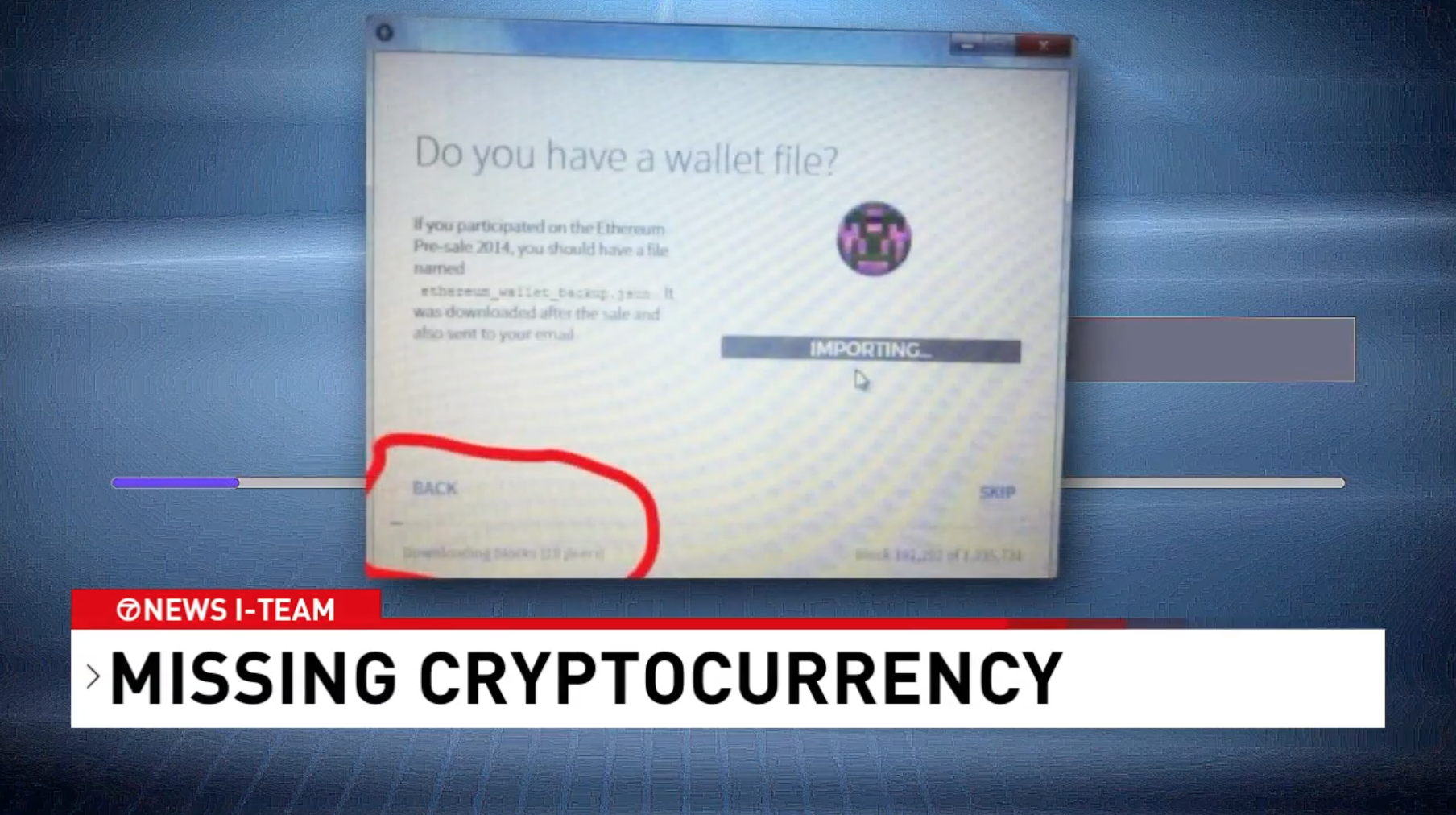
What would you do if you had around $6 million…but you couldn’t access it?
According to a recent news story from WJLA, the local ABC affiliate for the Washington D.C. area, one family is going through just that.
You’ve probably heard a slew of similar stories about people who bought into Bitcoin or other cryptocurrencies early, only to lose access to the wallet where the digital money was stored. According to the New York Times, billions of dollars in just Bitcoin, for example, is lost forever due to people forgetting their passwords or lost access to their accounts.
Yuki and Art Williams say they purchased 3,000 coins during the Ethereum presale back in 2014 before its launch. Today, Ethereum is the second-largest cryptocurrency, right behind Bitcoin.
Yuki and Art’s investment was worth around $932 then. It now amounts to around $6 million on the exchanges today.
However, the Williams’ lost cryptocurrency assets story is very different from the others. Many in the crypto community say they have never come across one like it.
What happened to the 3,000 ETH?
Back in July 2014, Ethereum’s developers needed funds to move forward with their vision. So, they set up a direct presale on their website at Ethereum.org.
One Bitcoin (BTC), which was going for around $560 at the time, would buy you 2,000 Ether (ETH) in the opening weeks of the presale.
Yuki and Art Williams say they invested. They set up an account with a password and went through the process to download the necessary JSON wallet file. They then sent 1.5 BTC from their Coinbase account, which would be worth $932 at the time, to the Ethereum presale wallet. They then received 3,000 ETH in return.
However, the family says something went wrong when they downloaded the JSON file, which acts as a private key needed to open and access your crypto wallet.
“The instructions were to leave your computer on for an hour and a half and as the progression bar showed it populating the JSON file would appear,” Art Williams said to WJLA. “Unfortunately for us, it did not appear.”
In WJLA’s TV report, screenshots are shared allegedly showing where the download failed.
According to Williams, they can see the 3,000 ETH in their wallet but cannot access it because they do not have the JSON file. They claim they contacted Ethereum for a backup JSON file via email but never received that either.
The Williams Family hired a lawyer in 2018 and tried to reach a compromise with the Switzerland-based Ethereum Foundation. There was even a settlement offer in discussion at one point.
In the end though, the Ethereum Foundation’s legal team came back and told them that the organization has “no liability for lost wallets, passwords, and Private Keys” and ended discussions, WJLA reports.
The Williams family then went to their local news station and is now crowdfunding on GoFundMe to raise $250,000 to take their case to international court.
Looking deeper into the story
This is a very interesting case and I have not come across anything quite like it. It certainly peaked the interest of Scott Taylor, the local reporter behind the story. According to his Twitter history, he has been pursuing it for years before it finally aired last week.
Based on screenshots provided by the Williams family in the news report, Mashable was able to find what it believes to be the Williams’ wallet. It does appear to contain 3,000 ETH that have gone untouched since July 30, 2015. This is the date that Ethereum actually launched, about a year after the presale first went live.
A comment left in November 2017 on the Etherscan transaction page seems to confirm the account belongs to the Williams family. A user by the name of “hanayukiart” writes:
“I have purchased ether during the pre-sale.
However .json file never populated (froze after while).
I’ve contacted the helpdesk for back up file but no answer. Any tips more me to gain access the wallet would be GREATLY appreciated.
Thank you for your time.”
The username also appears to match up with a YouTube channel belonging to the family that goes back over a decade.
Another comment left two months ago by the same user on a contract address page for another cryptocurrency reads:
“If we have to depend on Vitalik, we are doomed,” reads the comment, referencing Vitalik Buterin, one of the co-founders of Ethereum. “I bought 3000 eth presale, and they never sent me Json file for me to access it. Took it to Switzerland court, and they never helped me. Chanel [sic] 7 will be doing the story this month.”
So, it seems clear Yuki and Art Williams have been pursuing this issue for years. But, there are some things that don’t quite add up in the local news story, namely: the issue with the JSON file.
A JSON file is a very small file. It should take less than a few seconds to download. The claim that the Ethereum presale page told the family to wait an hour and a half for the download doesn’t add up either. A look at various archive versions of the Ethereum presale site does not mention this.
For example, here is a video uploaded to YouTube in August 2014 that walks through the Ethereum presale process. The Williams family would have purchased ETH during the presale this very same way. You can see the original pages and even the instantaneous download of the JSON file.
“It’s a very risky proposition buying Ethereum,” the video creator says at the start of the clip.
One can see by going through that process that multiple warnings are present urging the user to download the JSON file, saying that without that wallet file and the password, “your ether will be lost and unrecoverable.”
Another issue is the screenshot that allegedly shows the failure of the JSON file download. That is not what it shows.
The Ethereum wallet did not exist at the time of the presale. What’s pictured in that screenshot is an attempt to import the JSON file to an Ethereum wallet, a process that moves the ETH to the digital wallet. This would have occurred quite some time after the initial JSON download during the presale.
The local news report makes things a little confusing by mentioning Coinbase, a popular cryptocurrency exchange. However, ETH was not exchanged on Coinbase at the time. If you wanted to buy coins during the Etherium presale, you had to send Bitcoin to Etherium’s Bitcoin wallet, a process which occurred on Ethereum’s website. The Williams family appears to have simply used Coinbase for the Bitcoin transaction.
So, what’s going on here?
It appears that the Williams family was involved with an ETH purchase during the presale in 2014. Their public comments on their inability to access the 3,000 ETH go back to 2017. They then went to a lawyer in 2018.
Unfortunately, even though the timeline of events has now been corrected, it’s still unclear exactly went wrong and who is at fault, if anyone.
It’s possible that something went haywire for the Williams during the Ethereum presale when they attempted to download the JSON file. In addition to downloading the JSON on the Ethereum website, they should have received an email. The Williams family says they did not. However, even at the time of the presale in 2014, Ethereum noted, you’d be out of your money in this case.
From a 2014 post on the Ethereum website titled “Ether Purchase Troubleshooting,” Buterin wrote: “You should receive a backup of your wallet in your email. If you entered a fake email address, and at the same time forgot to download your wallet, then unfortunately you have no recourse.”

Credit: WJLA
However, the screenshot that claims to show the failure at presale is actually from at least a year later when there was an attempt to import a JSON file to an Ethereum wallet.
Was there some sort of glitch that doomed the Williams family’s presale investment from the start? If they never received the JSON file, what were they attempting to import in that screenshot?
Mashable attempted to contact the Williams family but did not hear back. The Ethereum Foundation will not offer public comment on the matter.
As for the local ABC affiliate, it’s clear they thought pursuing this story would be like other cases where it’s able to bring justice to consumers wronged by businesses. Not so, in crypto.
Ethereum’s role in this is unclear, but we know that Ethereum does not have access to these 3,000 ETH. Sure, if, hypothetically the Ethereum Foundation accepted responsibility it could reimburse the Williams in ETH, but as for the specific coins sitting in their wallet…those are likely lost forever.
It’s extremely unlikely the Ethereum Foundation would have access to any JSON files created during the presale. The organization also does not have any special access to users’ encrypted wallets.
But, also, of course, the Ethereum Foundation won’t. Imagine the floodgates that would open for everyone else trying to access their lost cryptocurrency riches?
A third-party website that created a walk-through for the Ethereum wallet specifically notes at the same spot in the process where the Williams family says their JSON file gets stuck: “Ethereum Wallet is still under development. In other words, you will have to expect mistakes when using it, in the worst case you will lose your money.”
And, unfortunately for the Williams family, it seems they have.
“Not your JSON, not your coins,” said David Gerard, an author and longtime cryptocurrency critic, in a tweet about the Williams family. “But it turns out the Ethereum Foundation is a touchable — and sueable — entity.”
In a previous phone conversation with Mashable, Gerard was adamant about how once you spend real currency on digital coins, one shouldn’t expect anything in return.
“If you buy the coin, your money is gone,” Gerard explained. “Your money has gone up in smoke and maybe you can get it back if you sell the magic beans to someone else, which is basically the story of crypto in general.”
If you invest in crypto, it’s not just possibly a bad investment you have to worry about. You can lose your money in a myriad of other ways too…even with coins that are now worth thousands upon thousands of dollars each.
For the Williams family and the many others who purchased the billions of dollars in cryptocurrency forever lost in untouchable wallets, they’ve learned that the hard way…or have they?
Looking at the “hanayukiart” username’s comment history on Etherscan, one can find the most recent remark left just two months ago in the comments of an individual’s wallet address.
The comment refers to Shiba Inu, a highly volatile alternative cyptocurrency, also referred to as a “memecoin.” Shiba Inu was created last year and its creation was inspired the most popular memecoin, Dogecoin. These types of cryptocurrencies have been popping up in droves over the last few months, often used for various money-making scams.
“You stole 414 Million of my Shiba too,” wrote hanayukiart alongside a handful of other comments claiming they had sent crypto to this wallet address by mistake. “I’ve reported to FBI. Make it right!”







